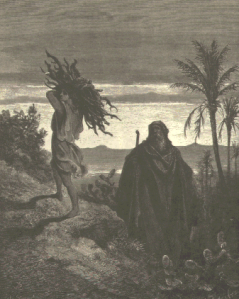
“Abraham took the wood of the burnt offering and laid it on Isaac his son, and he took in his hand the fire and the knife. So the two of them walked on together.” (Genesis 22:6)
One of the most often forgotten aspects of Abraham’s offering up of Isaac is the role of Isaac himself. Isaac is usually depicted as a young boy, or maybe an adolescent in his mid to late teens, in artwork dealing with the incident, as well as in the minds of those recounting or else hearing the story behind it. The logic seems to be that no young man having reached the age of maturity could have possibly willingly submitted himself under the knife of execution. He must have been a little tiny child, the reasoning goes, whom his father overpowered and tied down in order to carry out the sacrifice.
While the Genesis narrative does not tell us specifically how old Isaac was at the time, we know that his mother was 90 years old at his birth (Genesis 17:17). We also know that Sarah was 127 years old at the time of her death (Genesis 23:1), making Isaac 37 at the time. Since the very next event recorded after Abraham and Isaac return from Mt. Moriah is Sarah’s death, it would seem to make sense that the two events were at least somewhat close together chronologically. Personally, I believe that Isaac was 33 years old at the time, for reasons we shall see momentarily.
Regardless of Isaac’s exact age, we know that Abraham was an old man at this time, and we know that Isaac was at least old enough to bear upon his back the wood for the offering (Gen. 22:6). It would seem indisputable that Isaac was physically stronger than his elderly father. Had Isaac wanted to resist what his father was doing, he certainly could have done so. But Isaac did not. He was in complete trust and obedience to his father’s will, even unto the point of death. We speak so much of Abraham’s faith during this crisis, let us not forget Isaac’s!
“But [Jesus] emptied Himself, taking the form of a bond-servant, and being made in the likeness of men. Being found in appearance as a man, He humbled Himself by becoming obedient to the point of death, even death on a cross.” (Philippians 2:7-8)
The details that make this incident on Mt. Moriah such a vivid portrait of the incident nearly two millenia later on Mt. Calvary are staggering. Both involve a father and a beloved, only begotten son whom the father does not withhold. Both sons are obedient unto their fathers, even unto death. Both sons are delivered unto death, as it were, and returned again to their fathers alive on the third day (Gen. 22:4). Both bore upon their own shoulders the “wood” upon which they would offer up their lives (Gen. 22:6, John 19:17). And both went willingly to the place of execution, esteeming their own lives not so precious as fulfilling the will of the Father. Tradition holds that “Mt. Moriah” was the actual mount upon which Solomon’s Temple would later be constructed. Consequently, the very same ridge upon which Isaac was offered up, Jesus would be offered up. All of these similarities lead me to believe that Isaac was very likely the precise same age as our Lord was at the time each was “sacrificed.”
There are, of course, some important distinctions between the two, as well. A substitution was found for Isaac (Gen. 22:13), while Jesus Christ was the Substitution for all mankind. Isaac’s life was spared, while the Lord Jesus’ life was not. Yet for all intents and purposes, Isaac was as good as dead. In Genesis 22:10, we see Abraham’s hand poised above his son, ready to plunge the knife that would end his life. When the writer to the Hebrews looks back on this event, he speaks as if Abraham had actually gone through with the sacrifice (Hebrews 11:17-19). He even adds that Isaac’s “resurrection” was a figure of Christ’s (v. 19). James also refers to this incident as indicative of the faith of Abraham, demonstrating the reality of the faith that he possessed (James 2:21). Although Abraham did not actually sacrifice his son, his willingness to obey God and do so was considered an act demonstrating his faith.
Abraham’s faith was mighty as he obeyed God and did not hold back his beloved son. But Isaac’s faith was also mighty as he submitted to the will of God and the will of his father.
To Jesus Christ goes all glory. In service to Him,
Loren
[This post was originally published February 25, 2010]
[If you do not know the Lord Jesus Christ or you are not certain where you are headed when this life ends, I invite you to read the article “Am I Going To Heaven?“]
**Unless otherwise indicated, all Scripture quotations are taken from the New American Standard Bible (NASB) © The Lockman Foundation and are used by permission.
Scriptures marked (CSB) are taken from the Christian Standard Bible (CSB) Copyright © 2017 by Holman Bible Publishers. Used by permission. Christian Standard Bible®, and CSB® are federally registered trademarks of Holman Bible Publishers, all rights reserved.
Scriptures marked (NLT) are taken from the New Living Translation (NLT) Holy Bible,New Living Translation, copyright © 1996, 2004, 2007, 2013, 2015 by Tyndale House Foundation. Used by permission of Tyndale House Publishers Inc., Carol Stream, Illinois 60188. All rights reserved.
Scriptures marked (KJV) are taken from the King James Version of the Holy Bible, Public Domain.
Advertisements &b; &b;